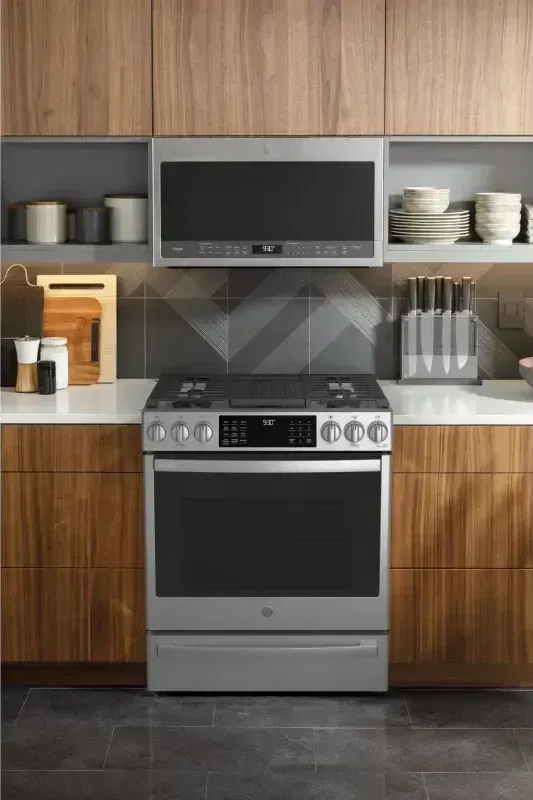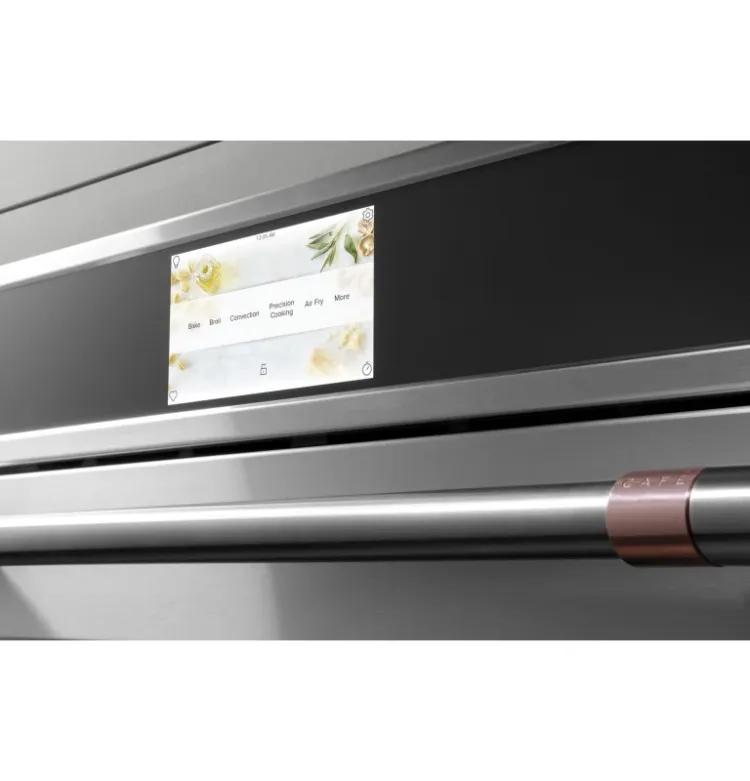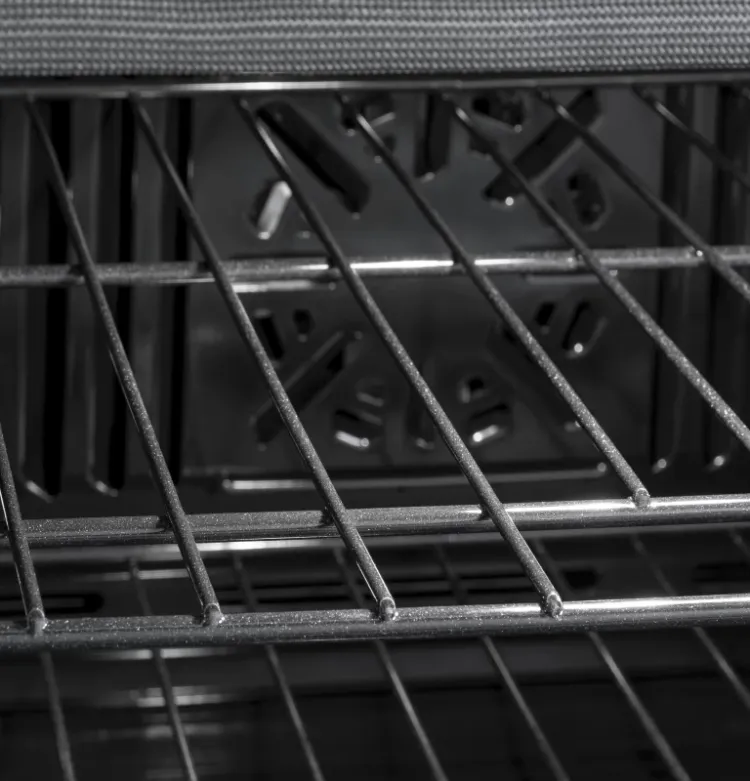Gas vs Electric Ovens: Which is Best for Your Kitchen?

Are you standing at the crossroads of kitchen appliance decisions, wondering whether a gas or electric oven is the best choice for your home? You're not alone! Many homeowners find themselves puzzling over this exact question when it's time to upgrade their kitchen or replace an old oven.
In this friendly guide, we'll dive into the great debate of gas vs electric ovens, helping you understand the key differences and make the best choice for your family's needs. Whether you're a baking enthusiast, a busy parent cooking for a crowd, or someone who just wants to reheat leftovers efficiently, we've got you covered.
The type of oven you choose can significantly impact your cooking experience, energy bills, and even the taste of your food. Gas and electric ovens each have their own set of pros and cons, and what works best for one household might not be ideal for another.
As we explore the world of ovens, we'll consider important factors such as:
- How gas and electric ovens actually work
- The key differences in performance and cooking results
- Cost considerations, both upfront and long-term
- Safety and maintenance requirements
- And ultimately, how to choose the best oven for your specific needs
So, whether you're team gas, team electric, or still on the fence, let's embark on this culinary journey together. By the end of this guide, you'll be equipped with all the knowledge you need to make an informed decision about the heart of your kitchen - your oven.
Ready to turn up the heat on your oven knowledge? Let's get started!
How Do Gas and Electric Ovens Work?
Understanding the basics of how gas and electric ovens operate can help you appreciate their differences and make a more informed decision. Let's take a closer look at the inner workings of these kitchen workhorses.
Gas Ovens: The Power of Flame
Gas ovens harness the power of combustion to cook your food. They typically use natural gas or propane as fuel. When you turn on a gas oven, an electric igniter creates a spark that lights the gas. This flame heats the air inside the oven cavity. Hot air then circulates throughout the oven, cooking your food through convection. Adjusting the gas flow controls the flame size and, consequently, the oven temperature.
Gas ovens are known for their quick heating and responsiveness. They can reach high temperatures rapidly, making them great for tasks like broiling or creating a crispy pizza crust. The instant heat and precise control over the flame allow for quick temperature adjustments, which can be particularly useful for certain cooking techniques.
Electric Ovens: The Element of Precision
Electric ovens rely on heating elements to cook your food. These ovens plug into your home's electrical system and have two main heating elements - one at the top for broiling and one at the bottom for baking. When you turn on an electric oven, electricity flows through the elements, causing them to heat up. These hot elements radiate heat, warming the air inside the oven. A thermostat monitors the oven temperature and cycles the elements on and off to maintain the set temperature.
Electric ovens are praised for their even heat distribution and precise temperature control, making them a favorite among bakers who need consistent results. The steady, dry heat provided by electric ovens is particularly good for baking cakes, cookies, and other delicate baked goods that require precise temperatures.
The Convection Factor
Both gas and electric ovens can come with convection settings. In a convection oven, a fan circulates hot air throughout the oven cavity. This promotes even cooking and can reduce cooking times. Convection is particularly useful for tasks like roasting and baking multiple trays at once.
Whether you choose a gas or electric oven, a convection feature can enhance your cooking experience. It can help achieve more even browning, crisper exteriors on roasted foods, and can often reduce cooking times by up to 25%.
Key Differences Between Gas and Electric Ovens
When it comes to the gas vs electric oven comparison, understanding the key differences can help you make the best choice for your cooking needs. Let's explore the main areas where gas and electric ovens diverge:
Heat Distribution
Gas Ovens:
Gas ovens are known for providing more instant heat, which can be advantageous for certain cooking techniques. The open flame at the bottom of the oven creates a more humid environment, which can be great for keeping foods moist during cooking. However, this can also lead to some challenges. The heat in a gas oven tends to be more intense at the bottom, which can result in uneven cooking if you're not careful. You might find that you need to rotate your dishes or use different rack positions to ensure even cooking.
Electric Ovens:
Electric ovens, on the other hand, are praised for their even heat distribution. The heating elements in an electric oven, typically located at the top and bottom, provide a more consistent heat throughout the oven cavity. This even heat is particularly beneficial for baking, where consistent temperatures are crucial for achieving perfect results. If you're a fan of baking cakes, cookies, or delicate pastries, an electric oven might be your best friend in the kitchen.
Temperature Control
Gas Ovens:
When it comes to temperature control, gas ovens have their own unique characteristics. They heat up quickly and respond almost instantly to temperature adjustments. This rapid response can be a big advantage if you need to switch between different cooking temperatures quickly. However, gas ovens can be less precise in maintaining exact temperatures. The nature of the open flame can create some temperature fluctuations, which might require a bit more attention from the cook.
Electric Ovens:
Electric ovens shine when it comes to precise temperature control. While they may take a bit longer to preheat, once they reach the desired temperature, they're excellent at maintaining it consistently. This steady temperature is crucial for recipes that require precise, consistent heat. The ability to hold a steady temperature makes electric ovens a favorite among bakers who need reliable results for their delicate creations.
Cooking Performance
Gas Ovens:
Gas ovens excel in certain cooking tasks. They're great for dishes that benefit from moisture retention, like roasts or breads with a crispy crust and tender interior. The moisture produced by combustion can help prevent food from drying out. Gas ovens also typically perform well for broiling, as the open flame provides intense, direct heat.
Electric Ovens:
Electric ovens are often preferred for their consistent cooking performance, especially in baking. The dry, even heat is perfect for achieving golden-brown crusts on pies and evenly baked cookies. Many bakers find that electric ovens provide more predictable and consistent results across a wide range of baked goods.
Energy Efficiency and Cost
Gas Ovens:
In terms of energy efficiency, gas ovens often have lower operating costs, especially in areas where natural gas is inexpensive. They use energy only when the flame is on, which can lead to cost savings over time. However, the initial installation can be more expensive if a gas line needs to be installed.
Electric Ovens:
Electric ovens are generally more energy-efficient in terms of the heat they produce versus the energy they consume. However, electricity rates can be higher than gas in many areas, which might result in higher operating costs. On the flip side, electric ovens are usually easier and less expensive to install since they only require a standard electrical outlet.
Understanding these key differences between gas and electric ovens can help you weigh the pros and cons for your specific situation. In the next sections, we'll delve deeper into the advantages of each type to further assist you in making the best choice for your home kitchen.
Advantages of Gas Ovens
When considering the gas vs electric oven debate, gas ovens have several compelling advantages that make them a popular choice for many homeowners. Let's explore the pros of gas ovens that might make them the right fit for your kitchen:
Rapid Preheating and Temperature Adjustment
One of the most significant benefits of gas ovens is their quick preheating capability. Gas ovens can reach high temperatures much faster than their electric counterparts. This means less waiting time when you're ready to start cooking, which can be a real advantage on busy weeknights or when you're preparing meals for a crowd.
Moreover, gas ovens offer almost instantaneous temperature adjustments. When you change the oven temperature, the flame responds immediately, allowing for more precise control over the cooking process. This responsiveness is particularly useful for recipes that require temperature changes mid-cooking.
Cost-Effective Operation
In many areas, natural gas is less expensive than electricity, making gas ovens more economical to operate in the long run. While the initial installation might be pricier, especially if you need to add a gas line, the ongoing costs can be lower. This can lead to significant savings over the life of the oven, particularly for households that do a lot of cooking.
Ideal for Roasting and Broiling
Gas ovens excel at certain cooking techniques, particularly roasting and broiling. The open flame in a gas oven provides intense, direct heat that's perfect for creating a crispy exterior on roasts while keeping the inside juicy. When it comes to broiling, the direct flame can achieve that perfect char on meats and vegetables that many cooks desire.
Moist Cooking Environment
Gas ovens naturally produce a more humid cooking environment due to the water vapor created during combustion. This added moisture can be beneficial for many dishes, helping to prevent foods from drying out during cooking. It's especially advantageous for baking bread, as the moist heat helps create that coveted crispy crust while maintaining a soft interior.
Functionality During Power Outages
Here's a practical advantage that many homeowners appreciate: most gas ovens can still function during a power outage. While you might need to light the oven manually, you can still cook meals even when the electricity is out. This can be a significant benefit in areas prone to power disruptions.
Preferred by Many Professional Chefs
Many professional chefs prefer gas ovens for their responsiveness and the level of control they offer. The ability to see the flame and adjust it visually adds an intuitive element to cooking that many culinary professionals appreciate. If you enjoy cooking and want to replicate a professional kitchen experience at home, a gas oven might be the way to go.
Durability and Longevity
Gas ovens often have fewer components that can break down compared to electric ovens. This simplicity in design can translate to greater durability and a longer lifespan, potentially saving you money on repairs and replacements over time.
Advantages of Electric Ovens
While gas ovens have their merits, electric ovens bring their own set of advantages to the table. Many homeowners find that the benefits of electric ovens align perfectly with their cooking needs and kitchen setup. Let's explore the pros of electric ovens that might make them the ideal choice for your home:
Consistent Baking Results
One of the standout features of electric ovens is their ability to maintain a steady, consistent temperature. This even heat distribution is a game-changer for baking enthusiasts. Whether you're whipping up a batch of cookies, baking a delicate soufflé, or crafting the perfect cake, an electric oven provides the reliable, consistent heat needed for predictable results. The stable temperature environment means less guesswork and more perfectly baked goods.
Dry Heat Advantage
Electric ovens produce a drier heat compared to gas ovens. While this might seem like a drawback at first glance, it's actually a significant advantage for certain types of cooking. The dry heat is excellent for crisping and browning foods. It's particularly beneficial for tasks like roasting vegetables, where you want to achieve a crispy exterior. Bakers also appreciate this feature for creating perfectly crisp crusts on bread and pastries.
Enhanced Safety Features
When it comes to kitchen safety, electric ovens have a slight edge. There's no open flame or risk of gas leaks, which can be a relief for many homeowners, especially those with young children. The absence of gas also means you don't have to worry about proper ventilation to the same extent as with gas ovens. Many modern electric ovens come with advanced safety features like automatic shut-off timers and child locks, providing additional peace of mind.
Easier Cleaning and Maintenance
Electric ovens often feature smooth, seamless interiors that are easier to clean compared to the more complex interior of gas ovens. Many electric models come with self-cleaning oven features that use high heat to burn off food residues, making maintenance a breeze. The smooth surfaces and hidden heating elements mean fewer nooks and crannies where grime can accumulate.
More Even Heat Distribution
While gas ovens can have hot spots, electric ovens are known for their even heat distribution. This is due to the placement of heating elements typically at both the top and bottom of the oven. The result is more uniform cooking, reducing the need to rotate dishes or adjust rack positions mid-cooking.
Better for Low-Temperature Cooking
Electric ovens excel at maintaining low temperatures consistently. This makes them ideal for tasks like dehydrating foods, slow cooking, or keeping dishes warm without overcooking. If you enjoy making dishes that require long, slow cooking at low temperatures, an electric oven might be your best bet.
Simpler Installation
In most cases, installing an electric oven is straightforward. As long as you have the proper electrical outlet, you're good to go. There's no need for a gas line, which can be a significant advantage if you're remodeling your kitchen or if your home doesn't already have a gas connection. This can make electric ovens a more flexible option for many homeowners.
Modern Features and Smart Technology
Many of the latest innovations in oven technology are more commonly found in electric models. Features like precise digital controls, multiple cooking modes, and even WiFi connectivity for remote monitoring and control are more prevalent in electric ovens. If you're a tech enthusiast who loves having the latest kitchen gadgets, an electric oven might offer more of the cutting-edge features you're looking for.
Cost Considerations: Gas vs Electric Ovens
When it comes to choosing between a gas and electric oven, cost is often a significant factor. However, it's not just about the initial price tag. To get a full picture of the gas vs electric oven cost comparison, we need to consider both upfront and long-term expenses. Let's break down the cost considerations for each type:
Installation Costs
Gas Ovens
Installing a gas oven can be more complex and potentially more expensive, especially if your kitchen doesn't already have a gas line. Here's what you might need to consider:
- If you don't have an existing gas line, installation can be costly.
- You'll need a professional to install the gas line and hook up the oven, which adds to the labor costs.
- Additional ventilation may be required, which could increase installation expenses.
Electric Ovens
Electric ovens generally have simpler installation requirements:
- Most kitchens already have the necessary electrical outlet, making installation straightforward.
- If you need to upgrade your electrical system to accommodate a new electric oven, costs can vary but are often less than installing a new gas line.
- DIY installation is more feasible with electric ovens, potentially saving on labor costs.
Purchase Price
The initial cost of the oven itself can vary widely based on brand, features, and size. Generally:
- Basic electric ovens tend to be less expensive upfront than basic gas models.
- High-end models of both types can be comparably priced.
- Dual-fuel ranges (gas cooktop with electric oven) are typically the most expensive option.
Operating Costs
This is where the long-term cost differences between gas and electric ovens become apparent:
Gas Ovens
- In many areas, natural gas is less expensive than electricity, leading to lower operating costs.
- Gas ovens heat up quickly, which can mean less energy used for preheating.
- Annual operating costs can vary, but might range from $20 to $60 depending on usage and local gas prices.
Electric Ovens
- Electricity tends to be more expensive than natural gas in most areas, which can lead to higher operating costs.
- Electric ovens are generally more energy-efficient, converting more of their energy input into heat.
- Annual operating costs will depend on usage and local electricity rates.
Maintenance and Repair Costs
Consider the potential costs of keeping your oven in good working order:
Gas Ovens
- May require more frequent professional inspections to ensure safe operation.
- Repairs can be more complex and potentially more expensive due to gas line considerations.
- Components like igniters and gas valves may need replacement over time.
Electric Ovens
- Generally have fewer components that can malfunction.
- Repairs might be simpler and less expensive in some cases.
- Heating elements may need replacement eventually, but this is usually a straightforward repair.
Long-Term Cost Comparison
When considering the total cost of ownership:
- If you already have a gas line, a gas oven might be more cost-effective in the long run due to lower operating costs, despite potentially higher upfront and maintenance costs.
- If you don't have a gas line, an electric oven could be more economical overall, especially if you don't do a lot of cooking.
- Energy prices in your area will play a significant role in long-term costs. Check local rates and consider future price trends.
Remember, while cost is important, it shouldn't be the only factor in your decision. Consider your cooking habits, the types of dishes you prepare most often, and which features are most important to you. The "best" oven is the one that meets your needs and fits your budget, whether it's gas or electric.
Making the Right Choice for Your Home
Remember, there's no one-size-fits-all answer in the gas vs electric oven debate. The best oven for your home is the one that aligns with your cooking habits, kitchen setup, budget, and personal preferences. Whether you choose gas or electric, modern ovens of both types can produce excellent cooking results.
Take the time to weigh your options, consider your priorities, and if possible, try cooking with both types of kitchen appliances before making your decision. With the information provided in this guide, you're well-equipped to choose the oven that will serve as the heart of your kitchen for years to come.


